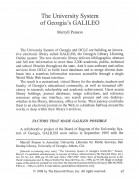GALILEO was born out of a history of necessity melding with ideas, ideas melding with opportunities, and opportunities melding with resources. Of course, the bulwark of functioning in a bureaucracy is the much-maligned committee, which is where, long before anyone knew it, GALILEO got its start. The Regents Academic Committee on Libraries (RACL) of the University System of Georgia (USG) was organized in 1968. RACL gave University System librarians an opportunity to meet regularly to discuss their concerns, possible common problems, and library management. Over time, computer technology became a part of library management, and with growth and new, expensive technology, costs escalated.
In an effort to manage costs and the burgeoning application of technology in libraries, the state EDP (electronic data processing) committee recognized that a coordinated effort would be necessary in the selection of efficient and cost-effective library automation systems. As a result, an advisory committee on information technology (IT) was formed in 1989 through the incentive of Dr. J.B. Mathews, then Vice Chancellor of Information Technology (VCIT).
The purpose of the advisory committee was to provide coordination, information, and support to USG libraries in information management and in automation. A core group of System librarians, along with a liaison from what is now the Office of Information and Instructional Technology (OIIT), began meeting on a regular basis in an effort to provide leadership for USG libraries. In keeping with the mandate of the EDP committee, the IT advisory committee made recommendations on the desired functions of an automation system and then selected a limited number of systems that could be adopted. The oversight of the IT advisory committee eventually expanded to address other library needs, such as lack of bibliographic records in computer format; resource sharing—especially electronic databases; and cost efficient automation of smaller libraries.
In August, 1994, the new Chancellor of the University System of Georgia, Dr. Stephen R. Portch, asked his advisory staff, including the liaison from the VCIT, to brainstorm in response to the question, “If you had $20 million, how would you spend it?” When the suggestion that $6 million be allocated to develop systemwide library services in the state of Georgia—shared databases, universal borrowing, unlimited access—realization of the expensive, logistically complicated idea seemed beyond expectation, much less reality. Everyone involved with developing the innovative project was excited, but cautious: library needs often go unmet because of scarce public dollars.
By the time the opportunity came to write a proposal for one statewide library in 1994, however, the committee had been compiling and incubating ideas that were able to be funneled into the focused effort that became GALILEO. The groundwork to write the proposal and the electronic infrastructure to allow ready implementation of the proposal of resource sharing already existed: PeachNet, Georgia’s telecommunications network for education. These developments converged with Governor Zell Miller’s dedicating state lottery money to education. GALILEO certainly was an educational advantage and became the beneficiary of lottery funds. Best of all, GALILEO would serve the entire population of Georgia, not only those formally enrolled in educational institutions.
The title, “A Vision for One Statewide Library,” crystallized through conference calls and e-mail among various staff. After a flurry of activity, the Chancellor, who was excited by the prospect of providing vastly improved and superior library access and services to USG students, faculty, and staff, received the completed proposal requesting $6 million dollars in his office as stipulated. Because access to PeachNet was integral to the success of this project, the Chancellor saw the need to include a PeachNet upgrade in the statewide library proposal; the funding request climbed to $10 million.
The Chancellor and his staff presented “A Vision for One Statewide Library” to the Georgia legislative committees prior to the Georgia General Assembly session that convened in January, 1995. Governor Zell Miller and the General Assembly supported and approved the proposal in late February, 1995. GALILEO was officially launched at University System of Georgia institutions on September 21, 1995. System institution librarians of Georgia eagerly set up workstations and printers purchased expressly for GALILEO, and paper records were converted to electronic format. As with many significant developments, a convergence of ideas, need, and opportunity created GALILEO.








